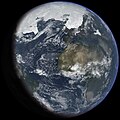Winter


Winter is one of the four season and it is the coldest time of the year. The days are shorter, and the nights are longer. Winter comes after autumn and before spring.
Overview
Winter begins at the winter solstice. In the northern hemisphere, the winter solstice is usually December 21 or December 22. In the southern hemisphere, the winter solstice is usually June 21 or June 22. Some animals hibernate in this season. In temperate climates there are no leaves on deciduous trees. People wear warm clothing, and eat food that was grown earlier. Many regions have snow in winter.
Holidays
Christmas
Holidays in winter for many countries include Christmas and New Year's Day. The name comes from an old Germanic word that means the "time of water" in reference to the rain and snow of winter in middle and high latitudes. Some nations do not have a time of the year which has temperatures too different than in other seasons. There is no snowing in many regions during winter.
Winter Media
In the mid-latitudes and polar regions, winter is associated with snow and ice.
In the Southern Hemisphere, winter extends from June to September, pictured in Caxias do Sul in the southern highlands of Brazil.
Sea ice in the Port of Hamburg, Germany
The snowshoe hare, and some other animals, change color in winter.
Winter landscape with skaters in the Dutch Republic during the Little Ice Age in the 17th century, by Hendrick Avercamp
River Thames frost fair, 1683, with Old London Bridge in the background
Allegory of Winter by Jerzy Siemiginowski-Eleuter with Aeolus' Kingdom of the Winds, 1683, Wilanów Palace
| Spring | Winter | ||
| The Seasons |
|||
| Summer | Autumn | ||











